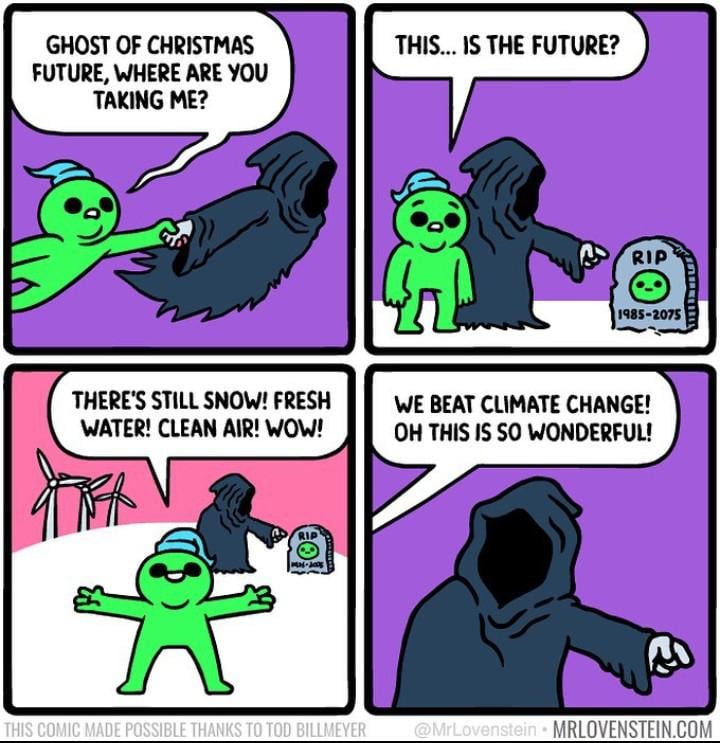There are 1.65 trillion barrels of proven oil reserves in the world as of 2016.
The world has proven reserves equivalent to 46.6 times its annual consumption levels. This means it has about 47 years of oil left (at current consumption levels and excluding unproven reserves).
This means that the oil is going to run out in our lifetime
Source/more reading: https://www.worldometers.info/oil/
Update: It is infact not true (or just partially true), because it only considers already known oil reserves that can be pumped out with current technology.
There is more oil that can potentially be used as technology and infrastructure advances, so the estimate of 50 years is wrong.
For the correction thanks to [email protected] (their original comment)
I wish this was true so that there would be a hard limit to within this century, on how much ff related damage we will do.
Unfortunately, they are still finding more, particularly in the north. How much yet-to-be-proven oil still out there is what really should be considered along with technology improvements that increase how much oil can be effectively recovered.
Not to mention the vast reserves known to be in Antarctica.
That treaty is only going to last so long before people start getting desperate and start fighting over it.
Oooh I didn’t think about that… I’ll update the post
The reason for the 50 years of oil, as I heard it explained, is that this is how far ahead the oil companies plan. They look for enough oil to cover the timeframe they plan for. When they have that covered, they don’t look, until they need more. When they need more, they go and find it.
I remember when they said there were 30 years left in the '90s.
Yeah, not trying to poke holes, but I was hearing “less than 50 years left” when I was in school in the 2000s. I do remember seeing a post here and there about new oil reservoirs being discovered but never any follow up. So I suppose that could be stretching things out. But oil use certainly hasn’t decreased in the last 25 years.
By 2050, there might even be 70 years of oil left!
“Peak Oil” they used to call it. Lots written about to collapse of everything after Peak Oil. Been predicted since at least 1970’s.
Now we need to run out for our own good.
Peak oil was about conventional oil. Had we not discovered other sources and methods for extraction then we likely would have run out. And running out isn’t accurate, it’s just that oil becomes harder to extract and thus too expensive for regular uses.
There are many things that were predicted as a collapse factor that we then innovated solutions to break past those barriers. We’re too smart for our own good, because each time we find new ways to keep going we make things worse and get ourselves even more into a dead end. When we do “run out” of oil of any type, which will happen at the growing rate we use it up, will we be smart again and find replacements for all the things petroleum is used for (not just fuel)? One important one being fertilizer to make food grow in our otherwise barren soils. Fun fact: people need to eat to live. Most people in the world, especially the western world, exists and survive because of food thanks to oil.
Lastly, we would have done so much better post-collapse if things had happened naturally with a smaller population and less damage to the environment. The higher you fall, the more it will hurt, and we’re damn high now compared to the mid/late 20th century.
Peak oil was about conventional oil. Had we not discovered other sources and methods for extraction then we likely would have run out. And running out isn’t accurate, it’s just that oil becomes harder to extract and thus too expensive for regular uses.
In other words, we did hit Peak Oil and that’s what caused the development of things like fracking, oil sands, and deep ocean drilling.
Peak oil was reached locally, not globally. Enough need to drive innovation, but not all of the fun aftereffects predicted.
I point this out as “peak oil” was more than just “no oil”, and I don’t want that lost on the young ones. It was about the collapse of everything dependent on oil.
Otherwise yes.
naturally with a smaller population and less damage to the environment.
You are correct. It is worth reminding others that humans nearly went extinct twice.
The way things are going we’re all going to be dead before it gets to that point
Probably because of all the dipshits in this thread specifically, acting like we don’t need to stop extracting and using oil.
And it could be caused by nuclear fallout before climate change gets critical
deleted by creator
This thread is filled with people who don’t grasp what a finite resource is. Saying “I remember hearing that x years ago”. Sure there’s probably more it there somewhere, but we don’t need to have to the finish on this. There are are kids who are going to grow up, people who aren’t born yet. Hell, at current rates, we might fuck up things with climate change. Which, even more reason to use less.
Call me selfish, but I want my nieces and nephews, to be able to grow up into a prosperous world and not some weird dystopian hellscape.
I think our point is that we don’t know if this is a good prediction or not. They both keeps crying wolf.
We’re not cheering for it, we’re just skeptical.
Skeptical of what? That it’s finite? Or how much is left? Or that climate change is real?
Because I’m definitely seeing people who think we have unlimited oil, that there’s always going to be more, and that climate change is not only a hoax but isn’t caused by humans at all. Some of those folks are in this thread, some of those folks I know in real life.
Skeptical of the timeline prediction, you disingenuous git.
Sorry you don’t like their tone but they’re right.
They’re right to put words in my mouth? Fuck on off with them.
I heard the same thing 30 years ago.
There are still unproven reserves waiting to be discovered.
Under the Arctic. Underneath the seabeds in the deep oceans. Probably other places that are hard to get to right now.
The question that really needs to be asked is not can we find more oil, we absolutely can and will seek it out. We should ask, can the environment that we live in support more burning of even more oil? We all know that answer, that’s why we’re cutting our emissions down rapidly. /s
The environment that we live in is more fertile now that we’ve got more CO2 in the atmosphere.
More people die of cold than of heat.
I’d say our environment is A-OK with us burning oil.
This is the dumbest thing I’ve heard in a month, and I heard donald trump talk.
Fertile for what though? It’s true there is more greening in some places, but that doesn’t equate to a better world for humans and animals used to the previous climate. Plants are better at adapting to this, for now anyway.
The fertility of the soil that I brought up isn’t even about CO2.
Fun fact, with climate change you can get both cold and heat deaths. Warming of the Earth doesn’t mean just heat.
Need to get outside of that echo chamber of climate denial. Oh right, you all have mostly moved on from denial to “it’s fine”. I forget the talking points sometimes. Harder to keep up with those than the facts.
These are healing hurricanes!
Fuck off, Ben Garrison
I genuinely don’t understand what you mean. Fertile how? It’s pretty obvious global temperatures are increasing, heat related deaths are more common in areas that previously weren’t an issue. Catastropic environmental events seem to happen every couple months.
You have an article you can share because it sounds like a bad take
The amount discovered in each of the last three years has been less than a year’s worth of consumption. The global consumption rate is still rising. At some point we will necessarily run out. The lack of readily available reserves has already lead to “innovations” like fracking, oil sands, and deep sea extraction. Those techniques weren’t profitable when production is easy, but they have delayed the inevitable.
I fully expect to see solar powered wells extracting oil that otherwise has a negative EROI in my lifetime.
I believe prices will increase dramatically long before we actually run out. Any non-critical usage of plastics and petroleum products will be phased out for economic forces if nothing else.
The trick is figuring out how to make that happen. Today.
You could easily argue that practically non-existent passenger trains and slow adoption of EVs in the US is primarily caused by cheap gasoline. Maybe if we fixed prices to be higher, we’d be able to make the progress we need
I believe gasoline is indeed heavily subsidized. I always thought that was a strange choice.
I was in Norway a few days ago and I was impressed how pretty much all the vehicles I saw were EVs and that the bus system appeared to be relatively efficient.
Yeah don’t bother thinking about the future. The market will sort it out. Just go buy some shit.
It actually gives me hope that there’s a chance we’re going to do something about it.
Honestly we’ve known peak oil would occur in our lives for several decades. Not that you could tell by any project to prepare for such an event.
There was 50 years worth of oil left 20 years ago too
“The report says we can release 565 more gigatons of co2 without the effects being calamitous.” “It says we can only release 565 gigabytes.” “So what if we only release 564?” “Well, then we would have a reasonable shot at some form of dystopian post-apocalyptic life, but the carbon dioxide in the oil that we’ve already leased is 2795 gigatons so…”
Point being, we already have oil we haven’t burned yet that will shoot us far past any limits we’ve pretended we’ll adhere to, and yet we’re still looking for more oil to dig up. How can this end well?
This means that the oil is going to run out in our lifetime.
Well, not in mine. So good luck with that!
The disconnect between the general public and the realities of the petroleum industry may be the largest gap in existence. Pretty much any article you read gets 99% of the info hilariously wrong as the journalist has no idea wtf they’re talking about.
I’ll be 91. I’m sure I’ll have bigger problems by that point.
…such as having been dead for the past 49 years!

Shiiit, 1985 to 2075? That’s a long life
Congrats on reaching 91!
I’ve heard this for my whole life. Oil runs out in X years, until they develop affordable ways to dig deeper and get at more
Cheapest oil runs out in x years. Mid cost in y years. Expensive in z years. Then we get into “manufactured” oils.
Oil isn’t going to run out, it’s just going to get more expensive.









